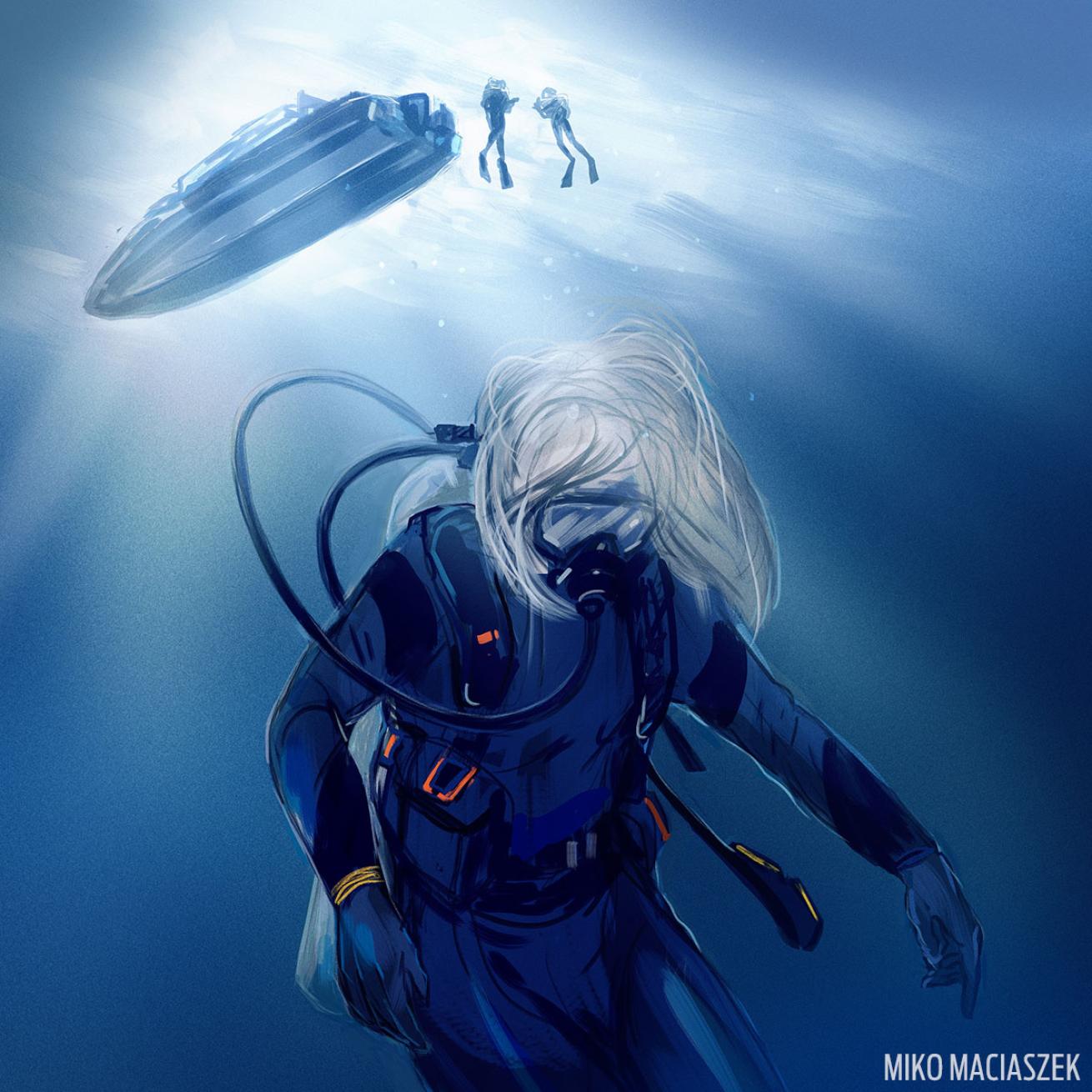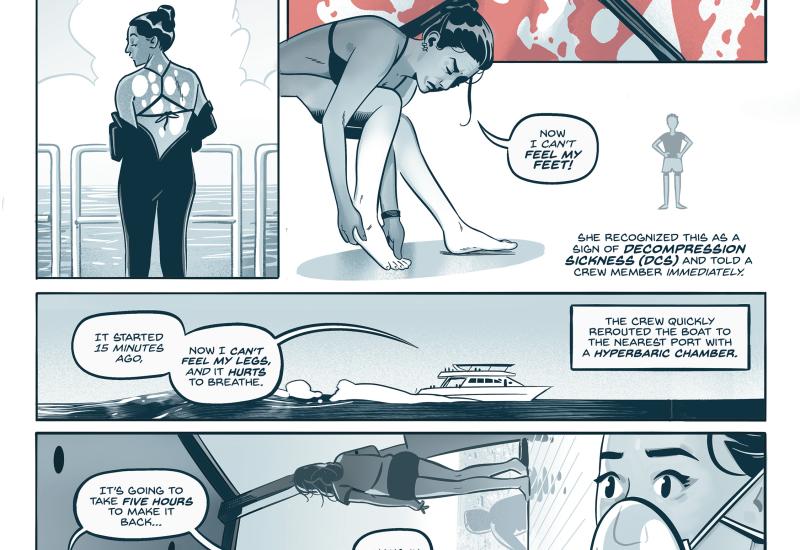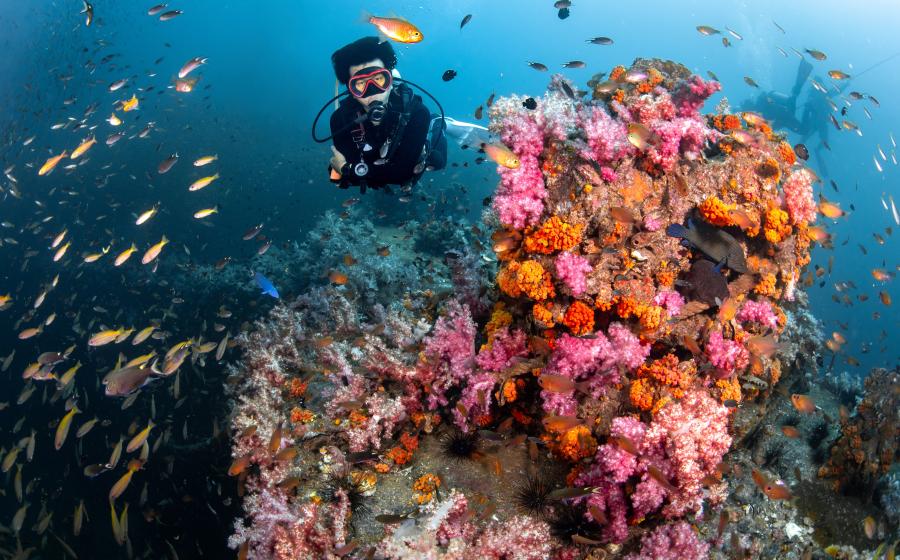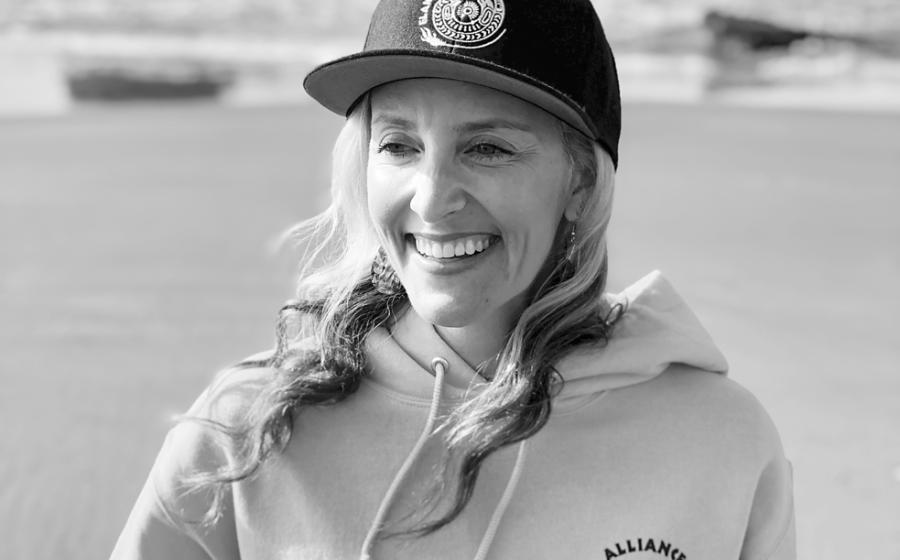Lessons for Life: Diver Runs Out of Air at Safety Stop
Judie was tired when she surfaced. It hadn’t been a good dive, and to make things worse, she ran out of air at the end of the dive within a few feet of the surface. Then she missed the tag line trailing behind the boat. As Judie floated away from the boat, she realized she didn’t have the energy to swim back to it. She wasn’t sure what she was going to do to get back on board.

Miko MaciaszekJudie took some weight from her weight pockets, but when the divemaster turned his back to help another guest, she put the weights in her BC pockets.
THE DIVER
With only 10 dives total, including her certification dives, Judie wasn’t 100 percent sure she wanted to keep diving. It seemed like a lot of work, and it didn’t seem to be getting any easier. She was 52 years old and healthy with no relevant medical conditions that would keep her out of the water. Still, she wondered if she was fooling herself about why she had decided to learn to dive in the first place. Certified in cool water in a local mountain lake close to her home, she was hoping diving would be fun. She loved looking at pictures in magazines and dreaming about exotic destinations.
In hopes of finding a place where the diving would be more enjoyable, Judie booked an offshore dive trip on a boat located a few hours from her home. This trip wasn’t exactly exotic, but at least the water would be warmer, and she’d wear a thinner wetsuit than the one she wore while diving in the mountain lake. That had to make things a little better. And she was sure she would see some colorful fish. She was looking forward to that.
THE DIVE
Judie geared up as the boat headed out from the dock. She was a little nervous about the dive since it was her first without her instructor or her dive buddies back home; it was also her first ocean dive. Still, it was a beautiful day, and the conditions seemed perfect. She added the same amount of weight to her BC’s integrated-weight pockets as she had at home.
The boat’s divemaster could sense she was a novice diver, so he watched as she geared up and was surprised at the amount of weight she put in her BC pockets. She had asked for 30 pounds of lead. Divers on the boat typically used between 12 and 16 pounds. The divemaster suggested to her that since she was diving with a thinner wetsuit than she used at home she could leave some of the lead behind. Judie took some weight from her weight pockets, but when the divemaster turned his back to help another guest, she put the weights in her BC pockets. She had always dived with 30 pounds at home in the lake and wasn’t comfortable making that change.
THE ACCIDENT
Several other divers on the trip noted that Judie struggled during the dive. She seemed to be constantly adjusting her buoyancy underwater, adding air and then letting it out. At the end of the dive, she headed back toward the boat with the group, but after the safety stop, she bolted the last 10 feet to the surface on her own. She had run out of air, which caused her rapid ascent. When she surfaced early, Judie missed the tag line, and the surface current pulled her away from the boat.
The rest of the divers swam underwater to the end of the tag line and then surfaced and inflated their BCs. The divemaster on board spotted Judie, and realizing she was floating away from the group, called to her to inflate her BC. She tried, but nothing happened when she pushed the button. She appeared to struggle on the surface, so the divemaster yelled to her that she needed to orally inflate her BC, but she didn’t listen. She began to struggle on the surface, flailing around with one arm while she continued trying to use the power inflator to fill her BC. A moment later, she sank below the surface and disappeared.
It took the boat crew a few minutes to get the other divers on board and organize a search for Judie. They got in the water as quickly as they could, but it took two hours of searching and additional emergency help before they found Judie unconscious underwater. Her tank was empty and she had drowned. She had all 30 pounds of lead still in place.
The cause of death was ruled a drowning due to insufficient air.
ANALYSIS
It’s not uncommon for divers trained in colder climates to forget to adjust their weighting to compensate for warmer water, especially among new, less experienced divers. They tend to dive with the weight they learned with, forgetting the lesson they learned in their open-water course: Do a buoyancy check in the water when diving in a different environment or with new equipment.
It’s also common in dive fatalities to find divers dead underwater with all their weights still in place, even though ditching weights is another skill learned during open-water training. In Judie’s case, the feeling of rising panic as she struggled to stay afloat while overweighted caused her to forget that she could simply pull the weight-release handles and drop 24 pounds of lead. Even with the remaining six pounds in her BC pockets, she would have been positively buoyant.
Of course, the entire chain of events began when Judie ran out of air near the surface. If she had finished the dive with even a few hundred pounds of breathing gas in her tank, she could have inflated her BC on the surface and waited for the boat to come pick her up. Or more likely, had she finished the dive with air in her tank, she would not have bolted for the surface, could have made contact with the tag line trailing behind the dive boat, and would have been able to inflate her BC. She would have finished the dive tired, but back on the boat.
Panic situations typically involve cascading steps of increasing discomfort with a final trigger that sets things in motion. Even before she began the dive, Judie was uncomfortable because she was in an entirely new environment. She was overweighted and struggled with buoyancy throughout the dive, adding to her agitation and discomfort. She used her air quicker than she normally would as she struggled in the water, constantly adding and dumping air from her BC.
The final trigger was when she ran out of air underwater and bolted for the surface. By the time she made it to the surface, she was likely in a full panic and not thinking clearly. At this stage, she could have orally inflated her BC or ditched her weights and managed the situation, but the perceptual narrowing caused by the panic made it difficult for her to remember her training or even listen to the instructions from the divemaster on board the boat.
Lessons for Life
1) MONITOR YOUR BREATHING-GAS SUPPLY. Running out of air underwater is a common trigger that leads to panic.
2) PERFORM A BUOYANCY CHECK. Any time you change your gear configuration or move to a new diving environment — like from fresh water to salt water or cold water to warm water — get in the water and check your weighting needs.
3) IF YOU FIND YOURSELF STRUGGLING on the surface and can’t inflate your BC, ditch your weights. The cost of the weights you are carrying isn’t worth your life. Many dive accidents involve divers unconscious on the bottom with their weights still in place.
4) ASK FOR HELP. If you are diving in a new environment, seek the appropriate training or talk to the local divemaster and explain you are a novice. He or she can answer any questions and try to help make sure you have a good dive.
Eric Douglas co-authored the book Scuba Diving Safety, and has written a series of adventure novels, children’s books, and short stories — all with an ocean and scuba diving theme. Check out his website at booksbyeric.com and follow him on Facebook.










